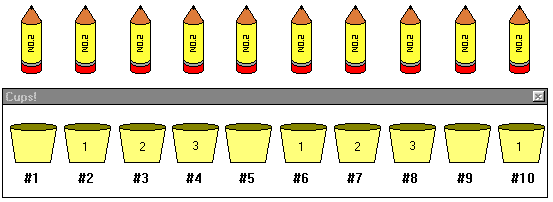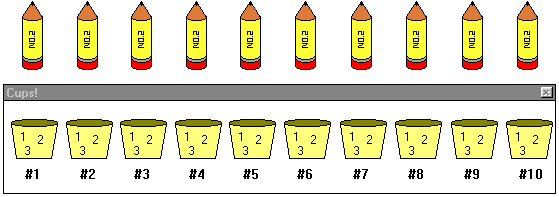Return to MODULE PAGE
Artificial Intelligence: Can a Machine Think? (Page 2)
David Leech Anderson: Author
Robert T. Arrigo: Programming
Andy Schmidgall: Programming
On the last page, we considered the question: Is Larry intelligent? Then we asked:
QUESTION 2: What are the best reasons for believing that Larry is not intelligent?
Did you jot down answer(s) that you think people might give to this question? Below are a couple of the answers that students have given in the past:
- N1: Larry isn't intelligent any more than a calculator or an automated dishwasher is.
- N2: It isn't Larry that is intelligent, it's the programmer who is. The programmer has built his own intelligence into the program.
There are other possible answers that we will consider later, but let's begin with these two. N1 is incomplete. It doesn't really answer the question. It implies that calculators and dishwashers are not intelligent (but doesn't give any reason why) and it implies that Larry is in some fundamental way similar to calculators and dishwashers (but it doesn't say what property they have in common nor why Larry is thought to have that property). The lesson, here, is that not everything that one might say is actually an answer to the question. Be careful. One might have good reasons for giving N1 as an answer, but those reasons must be stated or the question hasn't been answered.
Let's turn to N2, one of the most frequently given reasons for thinking that Larry is NOT intelligent.
- N2: It isn't Larry that is intelligent, it's the programmer who is. The programmer has built his own intelligence into the program.
This answer too, is a bit brief, leaving something unexplained. But it can be fleshed out a bit more as follows:
It isn't Larry that is intelligent, it is the programmer (in this case, Tony Kuzola). The programmer had to figure out what the winning moves were and then encoded that information in the program. All the program does is record the knowledge acquired by the programmer. Tony might have written this knowledge in a book; instead he encoded it into a computer program. But there is no more reason to say that the program is intelligent than to say that a book is.
This seems like a reasonable response. It is certainly true that Tony Kuzola (a student researcher from years back) simply encoded the winning moves into the program. Examine the image below. It shows the "winning" algorithm. The number in the cup below each pencil indicates the correct number of pencils to choose if that number of pencils remains. (Empty cups indicate there is no winning move from that position -- which is why Larry forfeits.)

Thus it looks like it is Tony who deserves credit for being "intelligent" because it is Tony who is responsible for learning the winning moves and then being smart enough to represent that knowledge in the form of a computer program.
If this is a reasonable response, then one might ask another question: "How exactly do we (humans) learn to win the game?" While some people with a math background might be able to compute the winning algorithm in their head [(S-1) modulo 4], most of us would probably figure out the winning moves by trial and error. We try certain moves, we remember both the successes and the failures, until we eventually learn the optimal moves. Let's assume that this is the way that Tony figured out how to win the game. We might then explain why Tony, the human being, is intelligent (but the program isn't) as follows:
Tony, the programmer, is intelligent (and Larry, the computer program, is not) by virtue of the fact that the programmer learned by trial and error what the winning moves are.
Do you find this claim plausible? Many people do. Many people think that an answer of this kind shows why it will always be the programmer and never the program that deserves to be called, "intelligent."
BUT HOLD ON A MINUTE! You have seen only one version of Larry, and not the most clever one at that. There is another version of Larry that has more sophisticated cognitive abilities. We call this program, Larry Learner. Unlike the first version of Larry, this version is NOT programmed with the winning algorithm. This Larry does not know any of the winning moves. All Larry Learner knows are the rules of the game. That is, he knows that from any given position, he is allowed to choose either 1, 2 or 3 pencils, which is indicated in the image below.

This version of Larry is easy to beat. Since he hasn't been programmed with the winning algorithm, his only option is to try to figure out the winning moves on his own. He does this by a system of trial and error. When it is his turn, he will choose one of the three options at random. Chances are, he will lose. However, if he does lose, he will remember which move led to the loss and he will never try that move again. The more he plays, the more he remembers; the more he remembers, the better he plays.
| PLAY LARRY LEARNER:
It is now time for you to play Larry Learner. [NOTE: If you want the first move in the game, click "Cancel" when the box comes up that says "Let Larry go first?"] Play the game until you have beat Larry at least 5 or 6 times. You will notice that after several games, cup #1 will empty. Pay attention to how Larry behaves in the games after the cup is empty. Did you notice any change in his behavior? Make note of any changes that you find interesting. Let's play! |
Play Larry Learner
Did you play Larry Learner often enough to see the numbers in the cups begin to disappear? If you did, you may have noticed that a pattern began to develop. As numbers were removed from the cups, every fourth cup beginning with the first (#1, #5, #9) would eventually be emptied completely. Every fourth cup beginning with the second (#2, #6, #10), would eventually end up with only the number "1" in it; every fourth cup beginning with the third (#3, #7) would end up with only the number "2" in it; and so on. If you were to play enough games, all of the cups would eventually be emptied of numbers except for the cup and number combinations representing the "winning" moves. Eventually, Larry Learner would arrive at the winning algorithm:

Assuming that this is indeed the way the program behaves (it is at least the way it is supposed to behave), we have an interesting development. Remember the discussion of the first Larry program when we asked: Is Larry intelligent? We considered the popular response that says:
Tony, the programmer, is intelligent (and Larry, the computer program, is not) by virtue of the fact that the programmer learned by trial and error what the winning moves are.
Notice that built into this response is a criterion sufficient for intelligence. In particular, it seems to be saying that anything that can "learn by trial and error what the winning moves are" is intelligent. But isn't that just what Larry Learner has done? If we are going to say that possession of that property is grounds for saying that Tony, the human being is intelligent, isn't it only fair to say that having that property is also sufficient for a computer program to be considered intelligent?
|
STUDY QUESTION: Are you willing, then, to say that
Larry Learner is intelligent? Some will say "yes." Many
others will say, "No." What do YOU say? And why?
|
Before leaving these issues, let us consider one more reason that some people give for saying that neither version of Larry is intelligent.
N3: Larry is not intelligent because Larry just does what he's programmed to do.
The claim seems to be that giving Larry the ability to "learn" doesn't make any significant difference because Larry was programmed to learn, and so the second version of Larry doesn't deserve any more credit for learning to win the game than the first version deserved for winning the game. There seem to be rather significant assumptions being made here. The first assumption is:
A1: Nothing that is programmed is intelligent.
If "not being programmed" is a necessary condition for being intelligent, then Larry is not intelligent -- for Larry is, by definition, a computer program. Since virtually everyone believes that human beings with normal cognitive abilities are intelligent, it is also being assumed by virtually anyone who would give N3 as an answer, that a second assumption is true:
A2: Humans are not programmed.
Are assumptions A1 and A2 true? If you believe that N3 does not give a very good reason for thinking that Larry is not intelligent, then one way of attacking it is to challenge one of the assumptions. How about A2? Are there reasons that one might give for thinking that A2 is false? That is, are there reasons for thinking that humans are programmed, at least in some sense of that term? Well, arguments of the following kind are frequently given:
Human beings are "programmed" in two important ways: by nature and by nurture. We are not the authors of our own intelligent abilities. First, our brains are complex organs that have built into them the mechanisms that make possible our reasoning abilities. YOU did not design or build your own brain. Either nature did (through evolution) or God did. But in either case, you don't get credit for it. Second, you have been taught and trained by many people, you have been nurtured. If you were raised by wolves, you wouldn't speak a language and you would be incapable of many forms of reasoning that you now take for granted. The training that you have received from other people is a kind of programming. Yes, the capacities that machines have were "built in" by humans, but the capacities that we have were "built in" as well. So A2 is false. Humans are programmed, at least in a certain broad sense of "being programmed."
Well, what do you think of that argument? Do you agree with it? or not?
|
YOUR COMMENTS: What is your own opinion of the argument just given? If you agree with it, be prepared to explain why. What convinces you? If you disagree with it, why? What reasons do you have for rejecting the arguments just given? |
While these arguments are interesting ones, there is another reason that is probably the most popular reason for saying the Larry Learner isn't intelligent. It is the fact that Larry's abilities are so narrow. He can only play Last One Loses with 10 pencils. We could easily play with 15 or 100. Larry can't lose on purpose so as not to hurt the feelings of a young child. Larry can't play any games other than Last One Loses. He can't play chess or checkers. In a word, Larry is very narrow and inflexible. And that just doesn't seem very intelligent to us.
Alan Turing is the most famous person to have argued that the hallmark of intelligence is a rich flexibility to be able to cope with new situations. Turing would not have considered Larry Learner intelligent because Larry could not begin to pass his test for machinge intelligence. If you don't already know about the Turing Test, this might be a good time to learn more about it.
The Turing Test



